Imagine it’s 3 AM, and you’re jolted awake by a nightmare. In your dream, your warehouse is in complete chaos – boxes stacked haphazardly, forklifts zigzagging aimlessly, and frustrated workers drowning in a sea of misplaced inventory. Sound familiar?
Your boss comes to you and asks you “What the hell is going on? You are responsible for the systems in this warehouse! Why do we have such chaos? Do you know your job?”
If you’re nodding along, you’re not alone. Many businesses struggle with warehouse management, but fear not! This article going to help you
in the murky waters of inventory control. We’ll dive deep into the best warehouse management systems of 2024, helping you turn that nightmare into a dream of efficiency and organization.
The Warehouse Woes: A True Story

Let me share a quick story. A few years back, I was consulting for a mid-sized e-commerce company. Their warehouse looked like it had been hit by a tornado – and not the organized kind. Josh (name hidden to protect identity), the warehouse manager, was at his wit’s end. “I feel like I’m playing a never-ending game of hide and seek with our products,” he confessed, dark circles under his eyes testifying to many sleepless nights.
That’s when we decided to implement a warehouse management system (WMS). The transformation was nothing short of magical. Within months, their pick-and-pack times halved, errors dropped by 80%, and Tom? Well, let’s just say he finally got to enjoy his weekends again. The WMS effectively handled their complex warehouse operations, streamlining processes and bringing order to chaos.
So for you, this article aims to help you find your perfect WMS match, just like Josh did. We’ll explore the best warehouse management systems, understand their features, and give you the reasons on what makes them the one on my list. By the end, you’ll be armed with the knowledge to choose a system that’ll make your warehouse work like clock work.
What Makes a Warehouse Management System Important?

Before we jump into our top picks, let’s quickly break down why these are the best options in the world of warehouse management systems:
-
Inventory Tracking: Real-time updates on stock levels
-
Order Fulfillment: Streamlined picking, packing, and shipping
-
Receiving and Putaway: Efficient handling of incoming goods
-
Reporting and Analytics: Data-driven insights for decision-making
-
Integration Capabilities: Plays nice with other software
-
User-Friendliness: Easy to learn and use
-
Scalability: Grows with your business
-
Mobile Support: Access on-the-go
-
Automation Features: Reduces manual tasks
-
Customer Support: Help when you need it
Keep these factors in mind as we explore our top picks. The warehouse management capabilities of these systems are crucial for optimizing warehouse operations, streamlining supply chain management, improving inventory tracking, and enhancing overall operational efficiency. Now, without any delay, let’s dive into the best warehouse management systems of 2024!
Best Warehouse Management Systems
1. Manhattan SCALE
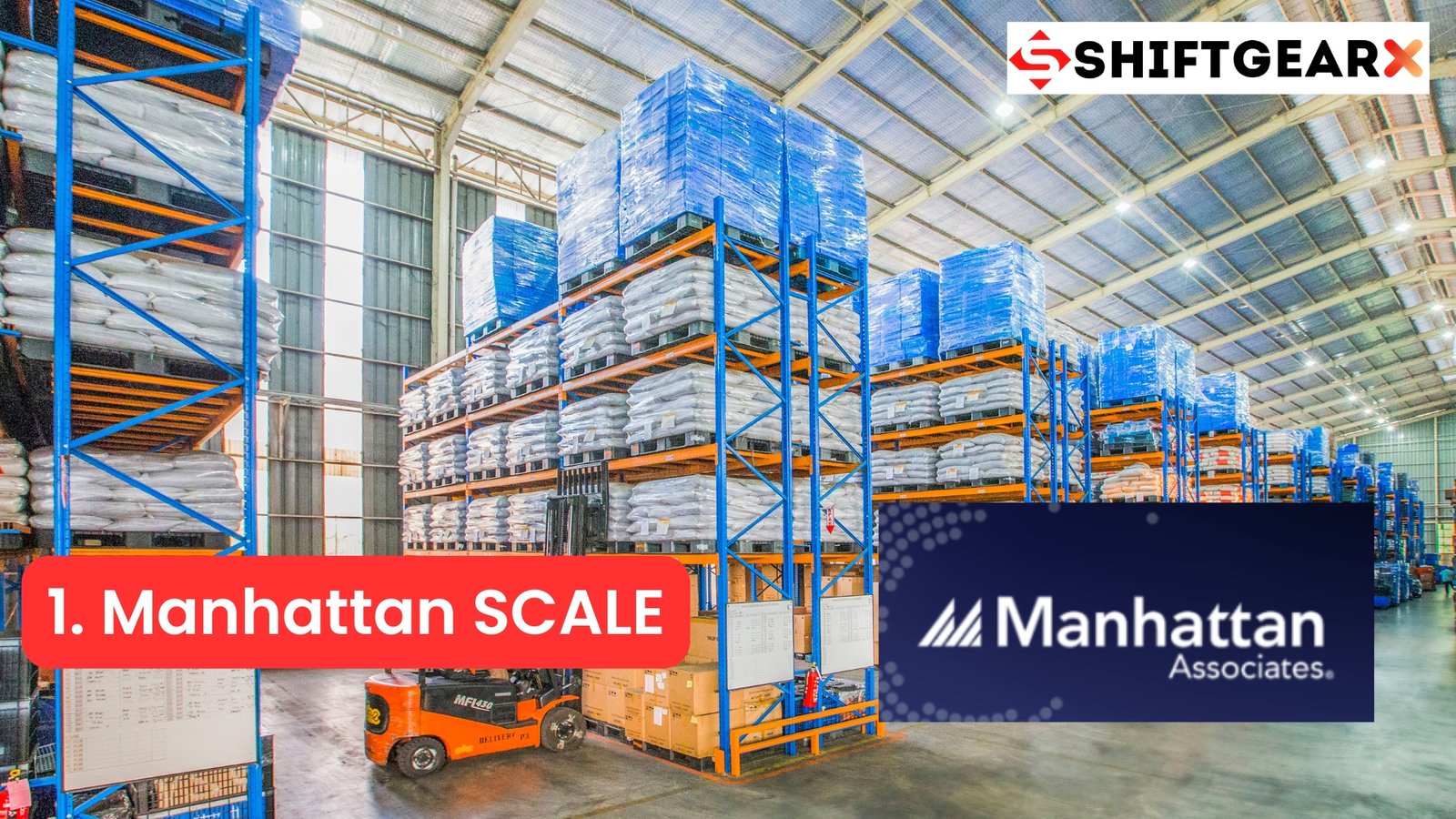
Manhattan SCALE Warehouse management system has been a major player in the WMS space for years, and it continues to impress with its robust features and scalability.
Pros:
-
Highly scalable for growing businesses
-
Strong inventory and order management capabilities
-
Efficiently handles operations across multiple warehouses, improving operational efficiency and reducing logistical complexities
-
Excellent integration with other supply chain solutions
-
Supports multi-channel fulfillment
Cons:
-
Can be complex to implement for smaller businesses
-
Pricing may be high for some organizations
Targeted Industries
| Aspect | Details |
|---|---|
| Industries Best Suited | 1. Retail and E-commerce: Handles high-volume order fulfillment, complex distribution networks, and warehouse optimization. 2. Logistics and Distribution: Supports efficient routing, inventory management, and shipment accuracy, ideal for 3PL providers. 3. Food & Beverage: Manages perishable goods with expiration tracking, temperature control, and regulatory compliance. 4. Pharmaceuticals: Ensures regulatory compliance, strict inventory controls, and expiration date tracking. 5. Consumer Goods: Handles large-scale inventory management, stock rotation, and timely order processing. 6. Manufacturing: Supports supply chain management, tracking of raw materials, WIP items, and finished goods. |
| Enterprise Size | Small Enterprises: Not typically targeted; may be too complex and costly for small businesses. Medium Enterprises: Well-suited; offers scalability and advanced features ideal for growing operations. Large Enterprises: Highly suitable; designed to handle complex, multi-location, and high-volume operations with extensive features and integration capabilities. |
| Why | Small Enterprises: Complexity and cost may be excessive for smaller operations with simpler needs. Medium Enterprises: Provides advanced features and scalability without requiring significant customization, supporting growth and optimization. Large Enterprises: Robust feature set and scalability make it ideal for large companies with complex, multi-location operations and high-volume warehousing needs. |
What Users Are Saying:
“Manhattan SCALE transformed our operations. We’ve seen a 30% increase in productivity and a significant reduction in errors.” – Sarah, Operations Manager at a large retail distributor
2. Oracle Warehouse Management Cloud
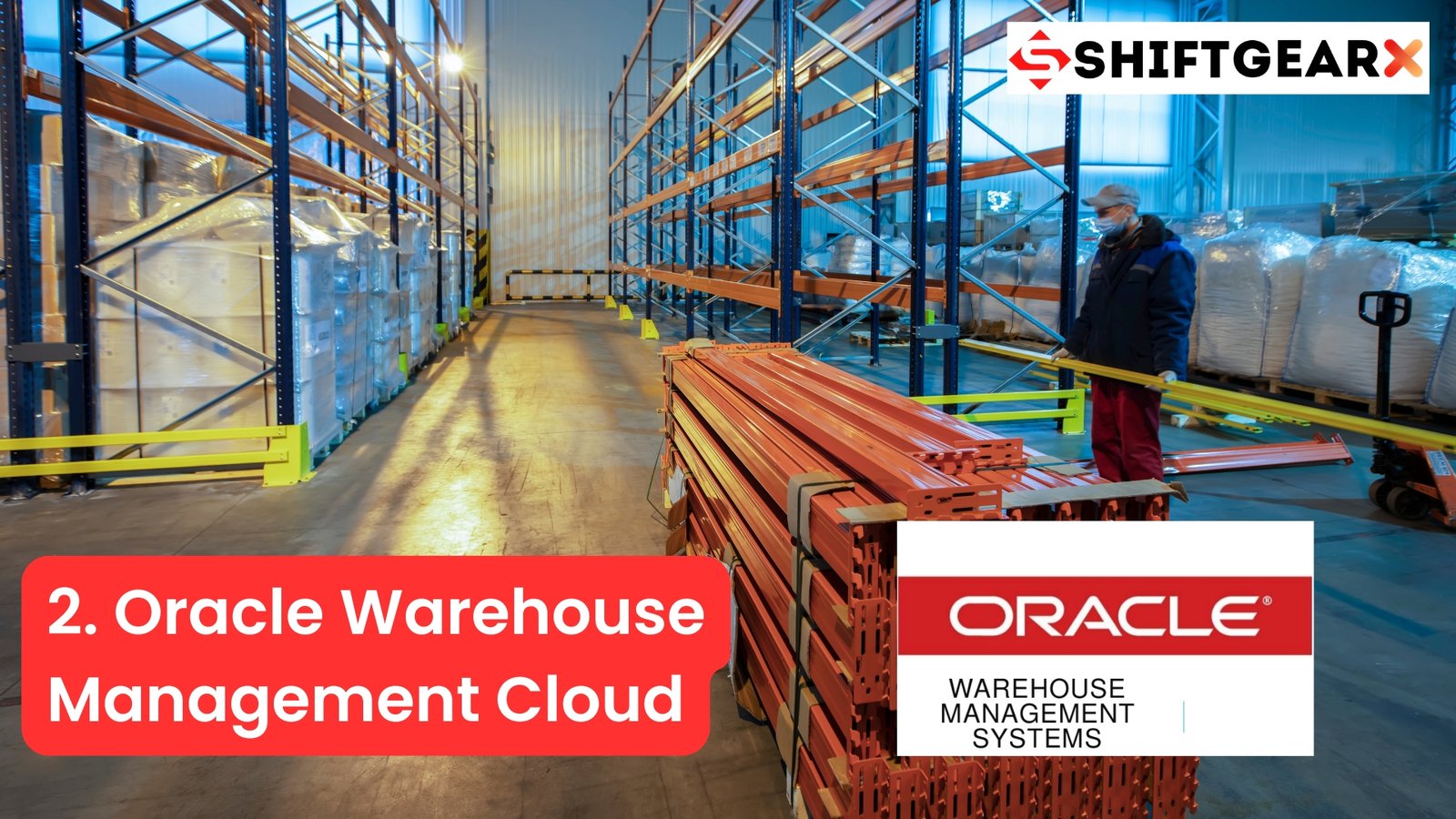
Oracle’s cloud-based Warehouse management system offers a comprehensive solution that’s particularly strong in analytics and reporting.
Pros:
-
Powerful analytics and business intelligence tools
-
Cloud-based for easy access and updates
-
Strong integration with other Oracle products and ERP systems, enhancing productivity and enabling seamless communication among different operational areas, particularly in logistics and inventory management
-
Flexible and customizable
Cons:
-
Can be expensive for smaller operations
-
May require significant training to fully utilize all features
Targeted Industries
| Aspect | Details |
|---|---|
| Industries Best Suited | 1. Retail and E-commerce: Supports omnichannel fulfillment, inventory accuracy, and efficient order processing across multiple locations. 2. Manufacturing: Manages complex inventory needs, including raw materials, work-in-progress, and finished goods, with integration into broader supply chain processes. 3. Logistics and Distribution: Enhances visibility and control over inventory, supports complex distribution networks, and optimizes warehouse operations. 4. Consumer Goods: Handles large inventory volumes, improves stock rotation, and supports timely order fulfillment. 5. Healthcare and Pharmaceuticals: Ensures compliance with strict regulations, manages expiration tracking, and maintains accurate inventory levels. |
| Enterprise Size | Small Enterprises: May be more feature-rich and complex than needed, with potentially high implementation costs. Medium Enterprises: Well-suited; offers robust functionality and scalability, making it ideal for businesses with growing or complex operations. Large Enterprises: Highly suitable; designed for large-scale, multi-location operations with advanced integration, automation, and scalability features. |
| Why | Small Enterprises: The system’s complexity and cost may exceed the needs of smaller businesses, making it more suited to larger operations. Medium Enterprises: Provides the necessary tools for managing more complex operations, with scalability to support business growth. Large Enterprises: Offers comprehensive features and scalability to manage large, multi-location warehouses with complex requirements, making it a strong fit for large enterprises. |
What Users Are Saying:
“Oracle WMS Cloud gives us insights we never had before. It’s like having a crystal ball for our inventory!” – Mike, Logistics Director at a multinational corporation
3. Fishbowl Warehouse
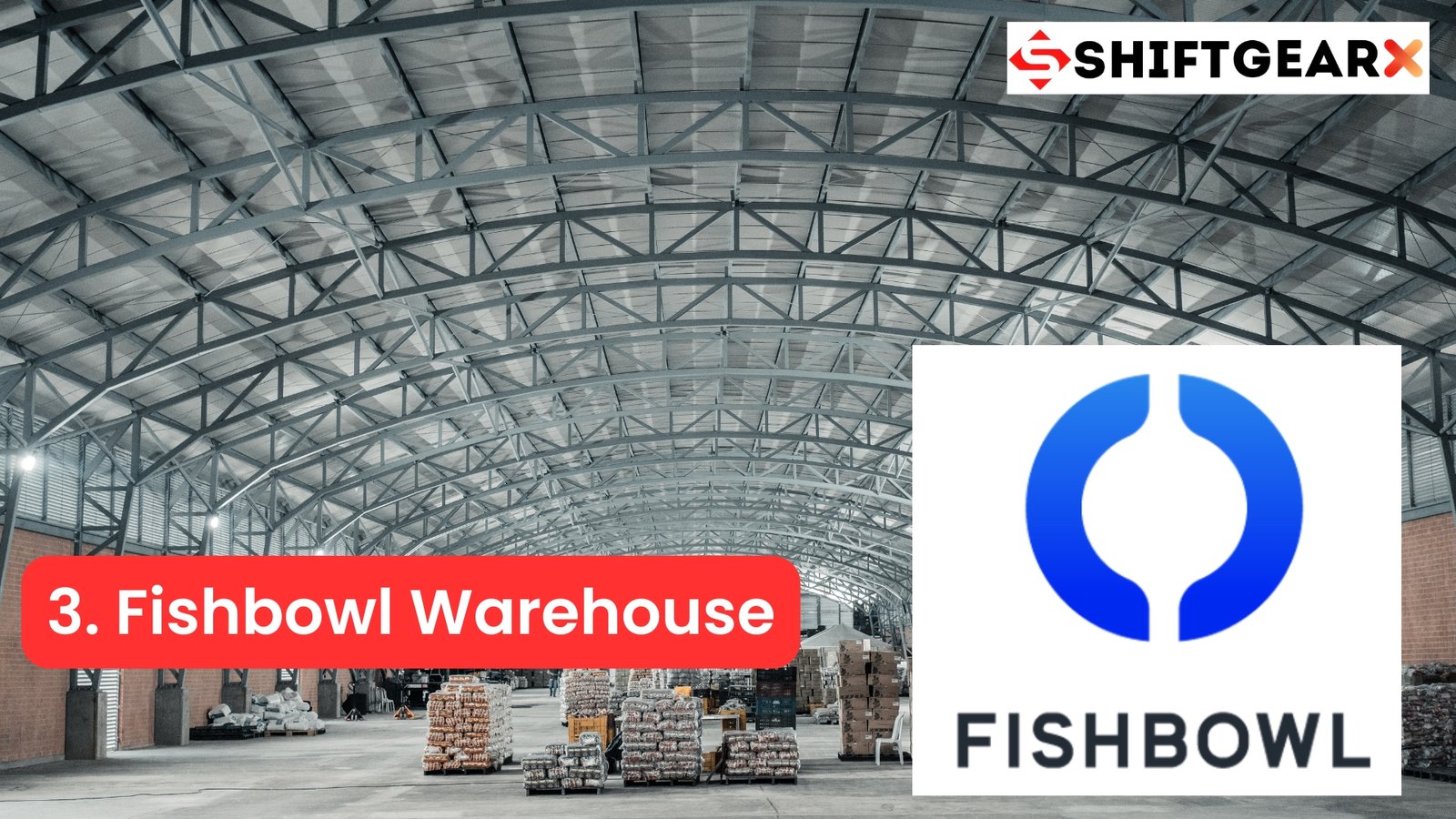
Fishbowl Warehouse management system is a popular choice for small to medium-sized businesses, offering a good balance of features and affordability.
Pros:
-
User-friendly interface
-
Integrates well with QuickBooks
-
Affordable pricing for smaller businesses
-
Helps streamline inventory management, enhancing operational efficiency and improving overall warehouse functionality
-
Good customer support
Cons:
-
May lack some advanced features needed by larger enterprises
-
Limited customization options compared to enterprise-level solutions
Targeted Industries
| Aspect | Details |
|---|---|
| Industries Best Suited | 1. Manufacturing: Ideal for small to medium-sized manufacturers needing inventory management, production tracking, and parts management. 2. Wholesale Distribution: Supports inventory control, order management, and efficient stock replenishment. 3. Retail: Helps manage inventory, track sales, and integrate with e-commerce platforms for small to medium retailers. 4. E-commerce: Provides inventory management, order processing, and integration with online sales channels. 5. Automotive: Manages complex inventory and parts tracking, ideal for small to medium-sized auto parts businesses. |
| Enterprise Size | Small Enterprises: Highly suitable; offers essential inventory management features at an affordable cost with ease of use. Medium Enterprises: Well-suited; provides robust features that can scale with the business, especially for those in manufacturing and distribution. Large Enterprises: Less suitable; may lack the advanced features, scalability, and integration capabilities required by very large or multi-location enterprises. |
| Why | Small Enterprises: Affordable and user-friendly, offering core inventory management features without overwhelming smaller businesses. Medium Enterprises: Provides a strong balance of features and scalability, making it a good fit for growing businesses with more complex inventory needs. Large Enterprises: May not offer the extensive customization, advanced features, or scalability needed for very large, complex operations. |
What Users Are Saying:
“Fishbowl was exactly what our growing business needed. It’s straightforward to use and has streamlined our entire inventory process.” – Lisa, Owner of a mid-sized manufacturing company
4. Blue Yonder Warehouse Management
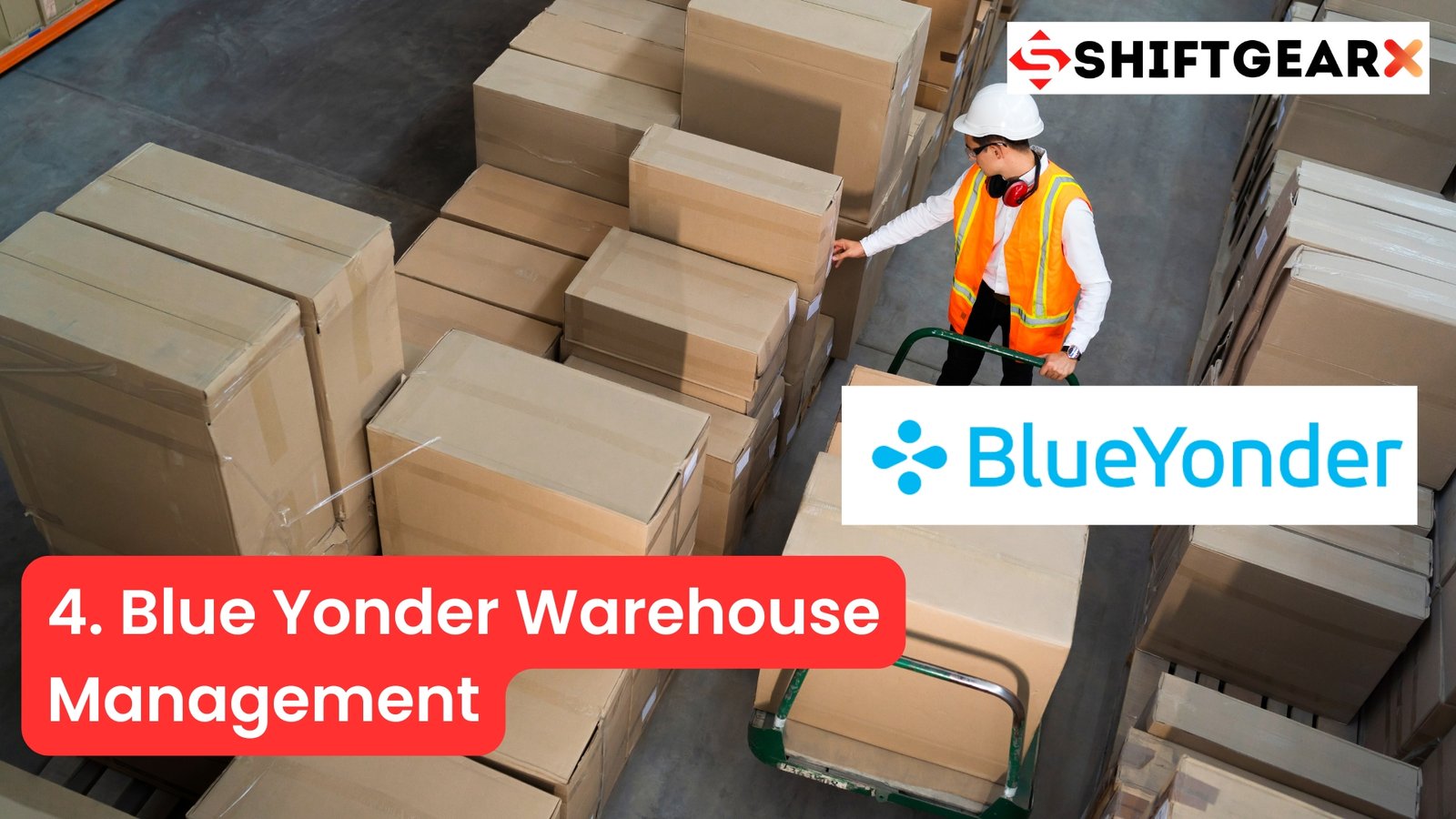
Blue Yonder Warehouse management system (formerly JDA) offers a WMS known for its advanced AI and machine learning capabilities to optimize warehouse operations.
Pros:
-
AI-driven inventory optimization
-
Advanced labor management features
-
Strong forecasting and demand planning tools
-
Comprehensive analytics dashboard
Cons:
-
Can be complex to implement and use
-
Higher price point compared to some competitors
Targeted Industries
| Aspect | Details |
|---|---|
| Industries Best Suited | 1. Retail and E-commerce: Optimizes omnichannel fulfillment, inventory accuracy, and warehouse efficiency for high-volume operations. 2. Logistics and Distribution: Enhances visibility, control, and automation in complex distribution networks, ideal for third-party logistics providers. 3. Manufacturing: Supports end-to-end supply chain management, including raw materials, WIP, and finished goods, with integration into production processes. 4. Consumer Goods: Manages large-scale inventory, ensures efficient stock rotation, and supports timely order fulfillment. 5. Food & Beverage: Provides advanced capabilities for managing perishable goods, temperature control, and compliance with industry regulations. |
| Enterprise Size | Small Enterprises: Typically too complex and costly, better suited for larger operations. Medium Enterprises: Suitable for medium-sized businesses with complex warehouse operations, offering scalability and advanced features. Large Enterprises: Highly suitable; designed for large-scale, multi-location, and high-volume operations, offering extensive customization, automation, and integration capabilities. |
| Why | Small Enterprises: The advanced features and costs associated with Blue Yonder Warehouse Management may exceed the needs of small businesses. Medium Enterprises: Provides robust, scalable features that support the growth and complexity of medium-sized businesses, particularly in industries with sophisticated supply chain needs. Large Enterprises: Offers the comprehensive functionality, scalability, and integration required for managing complex, global warehouse operations, making it a strong fit for large enterprises. |
What Users Are Saying:
“Blue Yonder’s predictive capabilities have revolutionized our inventory management. We’ve reduced stockouts by 40% while decreasing overall inventory levels.” – Alex, Supply Chain Manager at a large retail chain
5. NetSuite WMS
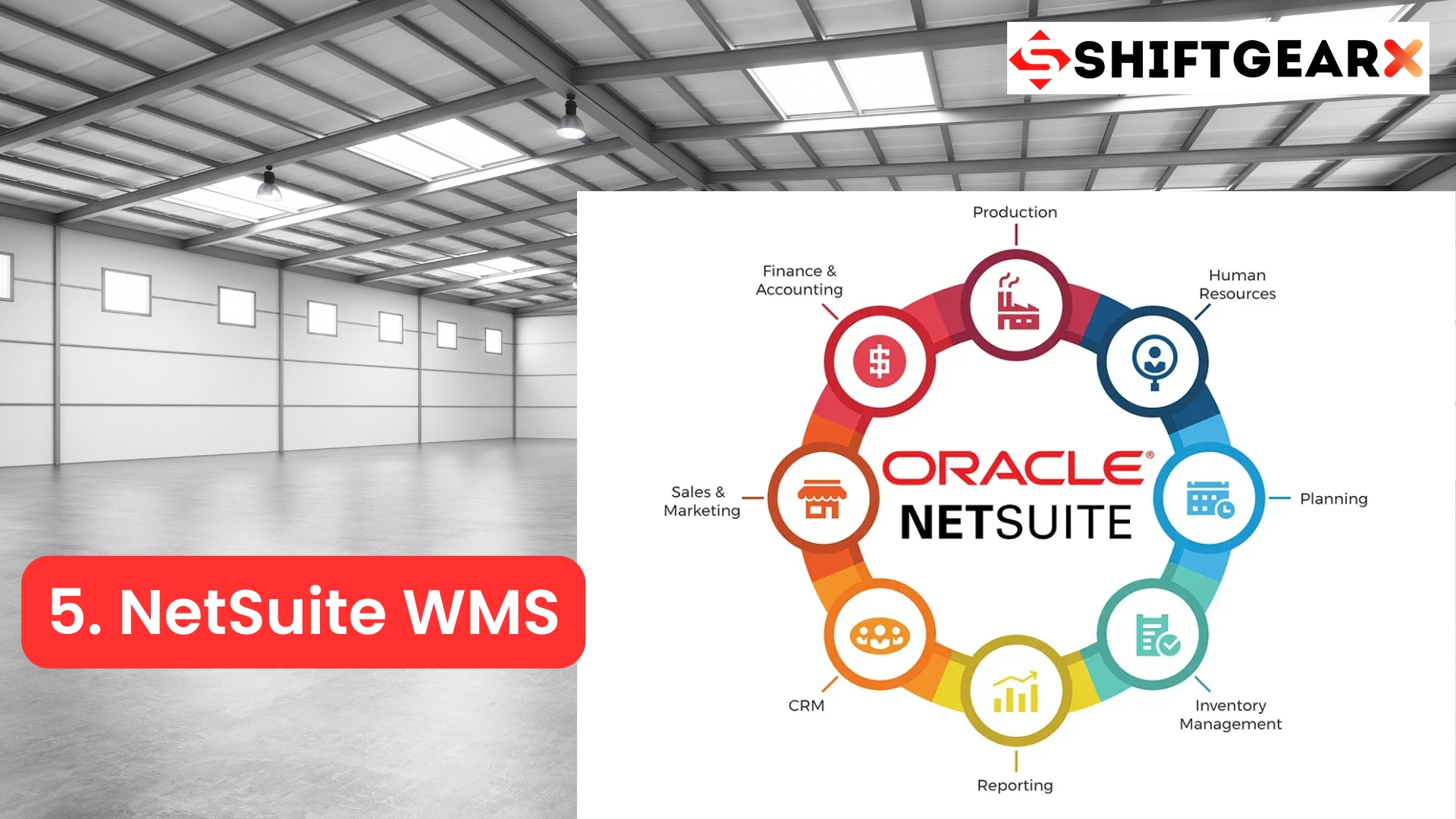
NetSuite’s WMS is part of their broader ERP solution, making it an excellent choice for businesses looking for an all-in-one system that includes customer relationship management.
Pros:
-
Seamless integration with NetSuite ERP
-
Real-time visibility across the entire supply chain
-
Cloud-based for easy access and updates
-
Strong multi-location inventory management
Cons:
-
Can be expensive, especially for smaller businesses
-
May have more features than needed if you’re not using the full ERP suite
Targeted Industries
| Aspect | Details |
|---|---|
| Industries Best Suited | 1. Retail and E-commerce: Ideal for managing inventory, order fulfillment, and omnichannel sales, with strong integration with NetSuite ERP. 2. Wholesale Distribution: Supports inventory control, order management, and efficient stock replenishment across multiple locations. 3. Manufacturing: Manages raw materials, work-in-progress, and finished goods inventory, with integration into the overall supply chain. 4. Consumer Goods: Handles large volumes of inventory, ensuring accurate stock levels and timely order fulfillment. 5. Health and Beauty: Manages complex inventories with expiration tracking, batch control, and compliance with industry regulations. |
| Enterprise Size | Small Enterprises: Suitable for small businesses, especially those already using NetSuite ERP, offering integrated and cost-effective WMS solutions. Medium Enterprises: Well-suited for medium-sized businesses, providing scalability, advanced features, and seamless integration with NetSuite ERP. Large Enterprises: Capable of supporting large enterprises, though it may require customization for very complex, multi-location operations. |
| Why | Small Enterprises: Offers essential WMS features with easy integration into existing NetSuite ERP systems, making it a cost-effective solution for small businesses. Medium Enterprises: Provides a robust set of features that can scale with the business, supporting growing operations with advanced warehouse management needs. Large Enterprises: Functional for large enterprises, particularly those using NetSuite ERP, but may require customization to meet the needs of very large or complex operations. |
What Users Are Saying:
“NetSuite WMS has given us unprecedented visibility into our operations. It’s like our entire business is speaking the same language now.” – Rachel, IT Director at a fast-growing e-commerce company
Making the Right Choice in Supply Chain Management: A Step-by-Step Guide

Now that we’ve explored our top picks for the best warehouse management system, you might be wondering, “How do I choose the right one for my business?” Fear not! Here’s a step-by-step guide to help you make the best decision:
-
Assess Your Needs: Take a hard look at your current processes. What’s working? What isn’t? Make a list of must-have features and nice-to-haves.
-
Consider Your Budget: Be realistic about what you can afford. Remember, a good WMS is an investment that should pay for itself in increased efficiency.
-
Evaluate Scalability: Think about where your business will be in 5 years. Can the WMS grow with you?
-
Check Integrations: Ensure the WMS can play nice with your existing software ecosystem.
-
Read User Reviews: Don’t just take the vendor’s word for it. See what real users are saying.
-
Request Demos: Get your hands dirty with free trials or demos. There’s no substitute for firsthand experience.
-
Consider Support: Look into the level of support offered. Good customer service can be a lifesaver when issues arise.
-
Involve Your Team: Get input from the folks who’ll be using the system day in and day out.
The Road to Warehouse Automation: Tips to Optimize Warehouse Operations & Inventory Management
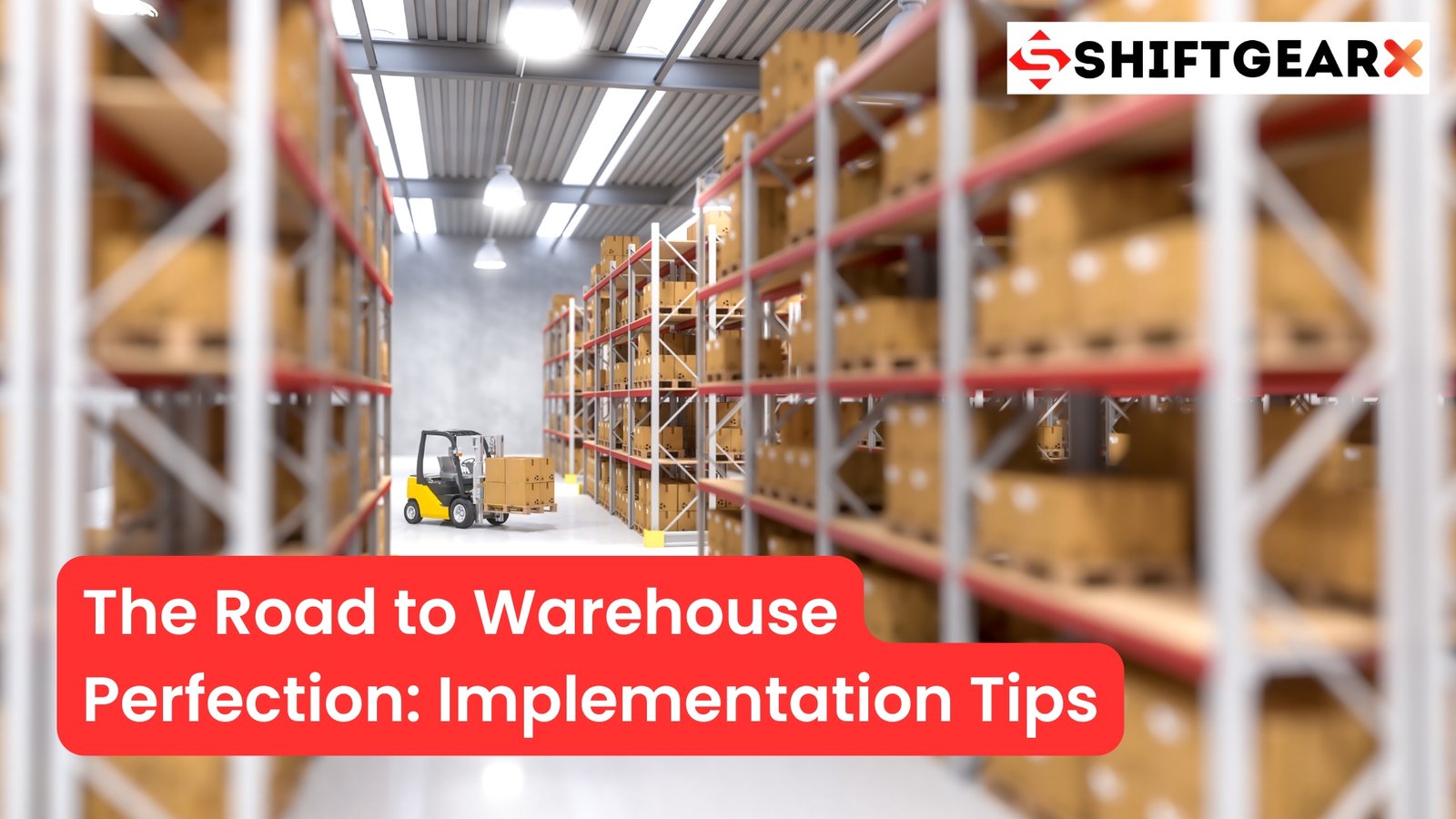
Optimizing warehouse processes is crucial when choosing the right WMS. Implementing it successfully is where the rubber meets the road. Here are some tips to ensure a smooth rollout:
-
Plan, Plan, Plan: Develop a detailed implementation timeline and stick to it.
-
Communicate: Keep your team in the loop throughout the process. Address concerns and build excitement.
-
Train Thoroughly: Invest time in comprehensive training. A well-trained team is crucial for success.
-
Start Small: Consider a phased rollout, starting with a single department or process.
-
Be Patient: Expect some hiccups along the way. Stay positive and focus on the long-term benefits.
-
Celebrate Wins: Acknowledge and celebrate milestones and improvements, no matter how small.
The Future of Warehouse Management: What’s on the Horizon?

As we wrap up our tour of the best warehouse management systems of 2024, let’s take a quick peek into the crystal ball. What does the future hold for warehouse management?
-
IoT Integration: Expect to see more systems leveraging Internet of Things (IoT) devices for real-time tracking and automated data collection.
-
SAP Extended Warehouse Management: This advanced system will play a crucial role in enhancing warehouse operations through automation and integration in the supply chain management process. It will optimize processes, improve visibility, and manage complex supply chain logistics while reducing costs and increasing efficiency.
-
Sustainability Features: As businesses focus more on reducing their environmental impact, WMS vendors will likely incorporate features to optimize packaging and reduce waste.
-
Advanced AI: Artificial intelligence will continue to evolve, offering even more accurate demand forecasting and automated decision-making capabilities.
-
Blockchain Integration: Some WMS providers may start incorporating blockchain technology for enhanced traceability and security.
Benefits of Implementing a Warehouse Management System
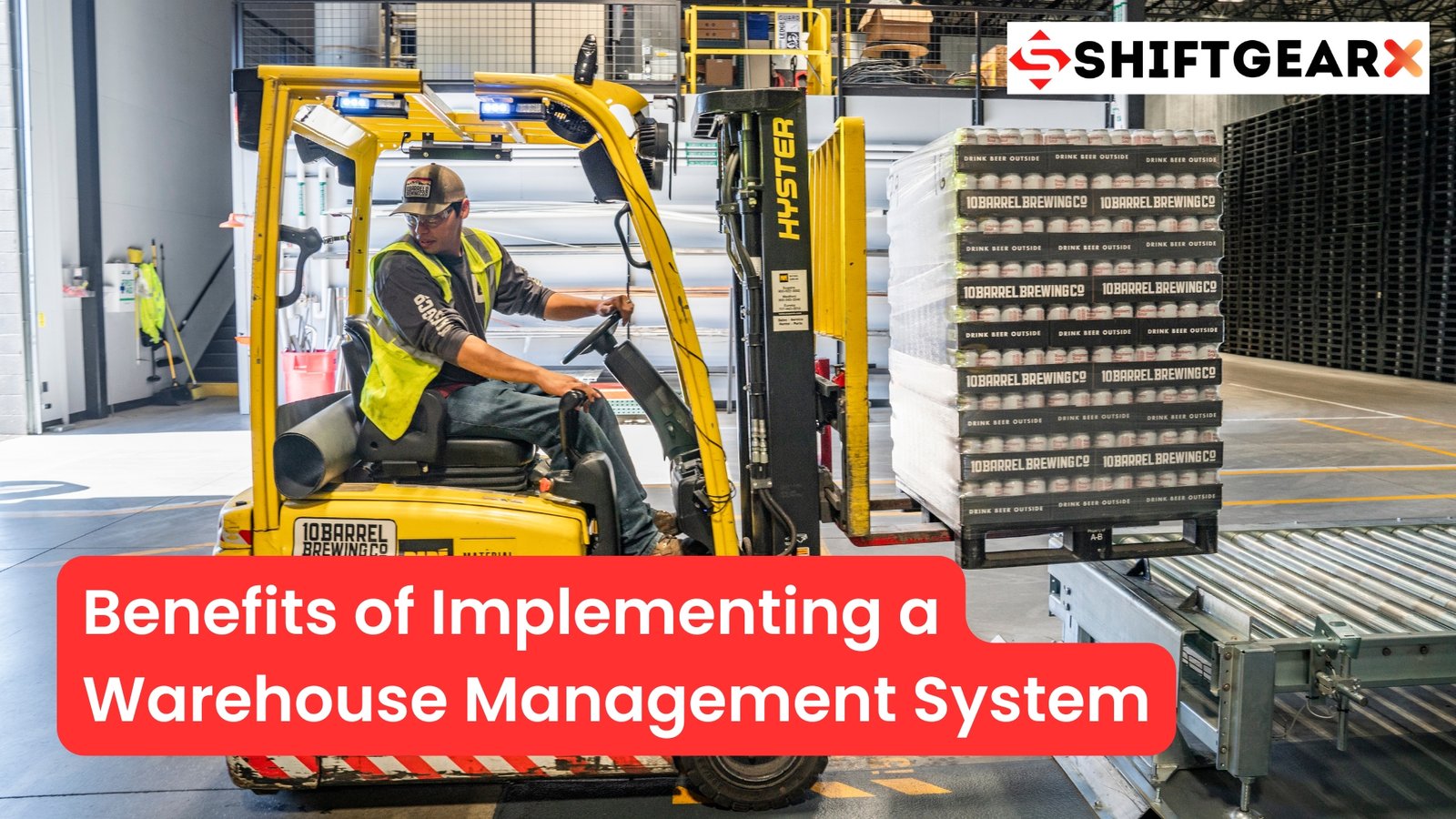
Implementing one of the top warehouse management systems can bring numerous benefits to businesses:
-
Improved Inventory Accuracy: Real-time tracking and automated processes reduce errors and improve inventory visibility.
-
Enhanced Productivity: Optimized workflows and task assignments increase overall warehouse efficiency.
-
Reduced Operating Costs: Automation and optimized space utilization lead to significant cost savings.
-
Better Customer Service: Accurate order fulfillment and faster shipping times improve customer satisfaction.
-
Increased Scalability: WMS solutions can adapt to growing business needs and handle increased order volumes.
-
Improved Compliance: Many WMS solutions help businesses adhere to industry regulations and standards.
-
Enhanced Decision-Making: Real-time data and analytics support informed business decisions.
-
Optimized Space Utilization: Intelligent storage algorithms maximize warehouse space usage.
-
Reduced Errors: Automated processes and barcode scanning minimize human errors in warehouse operations.
-
Improved Supplier Relationships: Better inventory management leads to more accurate forecasting and ordering.
Most Common Complaints about Top-rated WMS tools

-
Integration difficulties: Many businesses may struggle with integrating warehouse management solutions with their existing systems, such as ERP or e-commerce platforms.
-
Steep learning curve: Complex WMS tools might require extensive training for staff, leading to initial productivity dips.
-
Customization limitations: Some WMS solutions may not offer enough flexibility to meet specific business needs or industry requirements.
-
Cost concerns: High implementation and ongoing maintenance costs could be a common complaint, especially for smaller businesses.
-
Scalability issues: As businesses grow, some WMS tools might struggle to scale effectively, leading to performance problems.
-
User interface complexity: Some systems might have cluttered or unintuitive interfaces, making daily operations challenging for warehouse staff.
-
Real-time data synchronization: Issues with real-time updates could lead to inventory discrepancies and operational inefficiencies.
-
Mobile functionality limitations: In an increasingly mobile-first world, inadequate mobile support could be a significant drawback.
-
Reporting and analytics capabilities: Some users might find the built-in reporting tools insufficient for their needs.
-
Technical support quality: Inadequate or slow customer support from the WMS vendor could be a common frustration.
Subscribe to our website to get more information on all the technology information you need.
Also Read: 10 Leading Supply Chain ERP System Choices Featuring AI – Tech News Before It’s News | Shift GearX
You will also love: What is ERP System in Accounting and How Does it Work? – Tech News Before It’s News | Shift GearX












